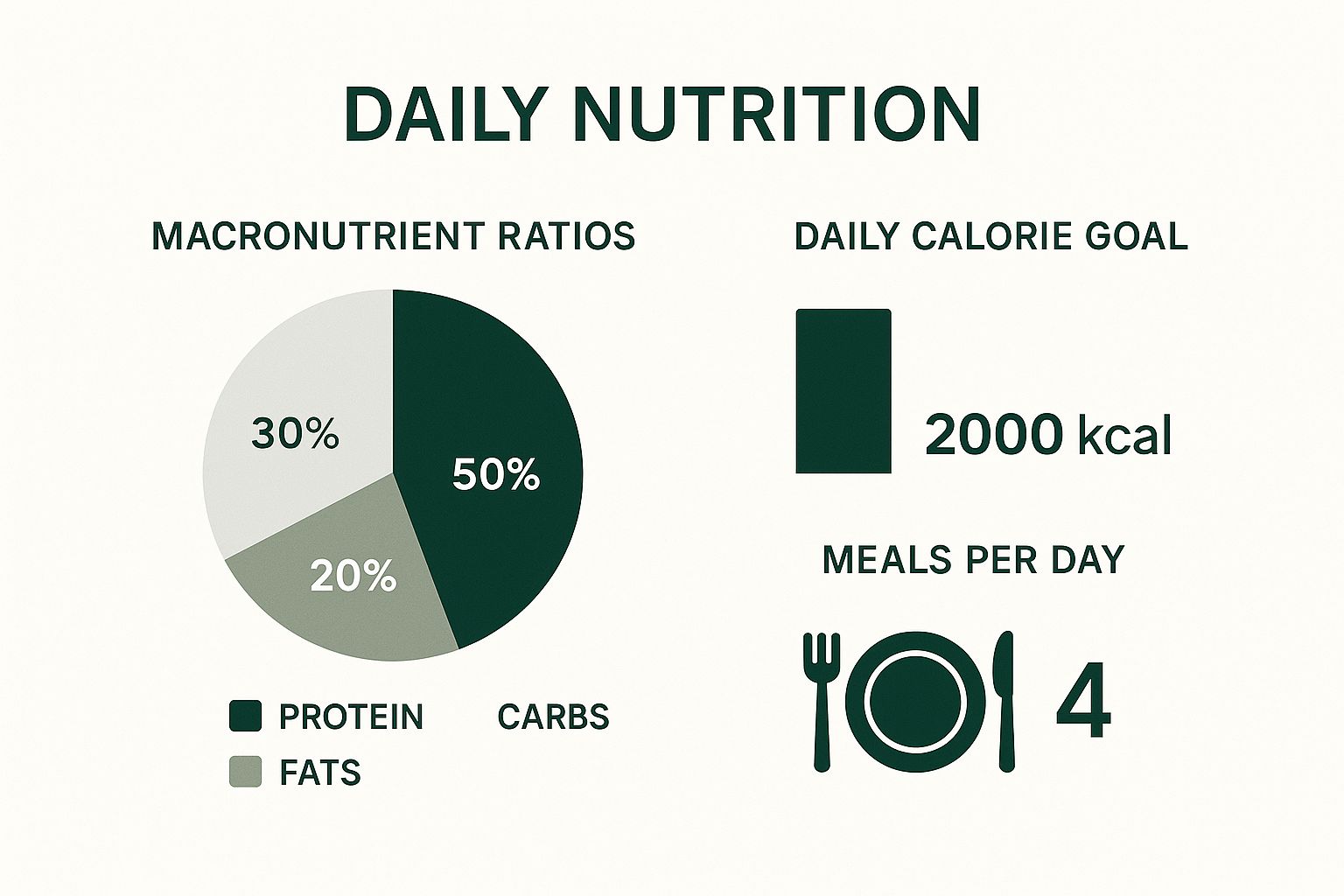Personalized Nutrition Plans That Actually Work for You
Master personalized nutrition plans with science-backed strategies that deliver real results. Transform your health with custom approaches that fit your life.
Love This Article?
Get personalized meal plans with recipes like this, automatically matched to your nutrition targets.

Personalized Nutrition Plans That Actually Work for You
The Science That Makes Personalized Nutrition Plans Work

Forget those one-size-fits-all diet fads! Personalized nutrition plans are all about you – your unique biology and individual needs. Instead of following the same old tired advice, these plans recognize that we're all different. What works wonders for one person might do absolutely nothing for another.
This approach is firmly rooted in science, particularly nutrigenomics, the study of how our genes interact with the food we consume. Think of it this way: your genes play a role in how efficiently you metabolize carbs or absorb vitamins. Pretty cool, right?
Personalized nutrition plans also factor in your individual metabolic differences. Things like your gut microbiome (that bustling community of bacteria in your digestive system) and your metabolic rate have a huge impact on how you process nutrients. This explains why two people can follow the exact same diet and end up with vastly different results. Personalized plans take these variations into account to provide you with a truly targeted strategy.
Understanding The Power of Data
These innovative approaches rely heavily on data analysis. By integrating information from various sources – things like genetic testing, metabolic profiling, and even your lifestyle data – these plans offer a level of personalization that traditional diets simply can't match.
The data crunching leads to actionable meal strategies designed specifically for your nutritional needs. No more guessing games about what to eat!
This rapidly growing field is exploding in popularity, thanks to advancements in technology and a growing demand for personalized wellness solutions. The global personalized nutrition market is booming. Get this: projections show it will be twice as large by 2025 as it was in 2020, with a whopping 15% Compound Annual Growth Rate (CAGR). This impressive growth is largely due to the integration of artificial intelligence, which helps process mountains of data to create individualized nutrition plans. Want to dive deeper into these stats? Check them out here: https://www.statista.com/statistics/1201697/personalized-nutrition-market-size-worldwide/
From Generic Diets to Precision Nutrition
Personalized nutrition goes beyond the limitations of generic diets. It's about working with your body, not against it, to reach your health goals. By understanding your unique biological blueprint, these plans empower you to make smart food choices that actually deliver sustainable and effective results. This scientific approach is transforming the way we think about nutrition and leading us into a future of precision health.
How Digital Innovation Is Changing Custom Nutrition

Remember the days when personalized nutrition plans were just for elite athletes or the super-rich? Well, thanks to some seriously cool tech advancements, that's all changing. Now, anyone can get in on the action! This shift towards personalized guidance is making custom health more accessible than ever, putting the power right at our fingertips.
The Rise of Accessible Personalized Nutrition
So, what’s driving this exciting change? It's a combination of things, really. We're seeing a surge in health-conscious consumers, and at the same time, there have been huge leaps in data analysis and artificial intelligence (AI). Companies like Nutrigenomix and Viome are leading the way, using techniques like microbiome analysis and continuous glucose monitoring to create incredibly detailed nutrition plans. Plus, with at-home testing kits becoming more available, getting your personal health data is easier than ever.
This market growth means better and more affordable options for everyone who wants a truly personalized approach to wellness. Think about apps like Meal Flow AI, which can generate meal plans and even create shopping lists based on your specific needs and preferences. No more guessing games at the grocery store – just healthy, delicious food tailored just for you.
The Power of Real-Time Tracking and Analysis
Wearable tech is also playing a big part in this nutrition revolution. Fitness trackers and smartwatches aren’t just for counting steps anymore. They can monitor your sleep, heart rate variability, and even your blood oxygen levels. This real-time data gives us incredible insights into how our bodies react to different foods and activities.
This means nutrition plans can be adjusted based on your body's unique feedback, making the whole process more effective. Plus, seeing this direct connection between food choices and overall well-being empowers us to make smarter decisions about our health. As a result, the digital personalized nutrition market is absolutely booming! It’s expected to jump from USD 669.3 million in 2024 to USD 3.09 billion by 2034, with a substantial CAGR of 14-16%. Want to learn more? Find more detailed statistics here.
Navigating The Digital Nutrition Landscape
Sure, with so many options available, navigating the digital nutrition world can feel a bit overwhelming. But by understanding the basics of personalized nutrition and sticking to scientifically-backed approaches, you can make informed choices that really help you reach your health goals. The future of personalized nutrition is definitely digital, bringing tailored wellness advice to everyone.
Why Everyone's Talking About Personalized Nutrition

The wellness world is abuzz, and personalized nutrition plans are the talk of the town. This isn't just a fad diet; it's a fundamental shift in how we view food and its effect on our bodies. People are ditching generic diets for a bespoke approach to eating.
The Shift Towards Individualized Wellness
This surge in interest comes from a few key places. First, we're finally realizing how much individual differences matter for our health. What works for one person might not work for another. Second, many are tired of generic diet plans that fail to deliver.
Personalized nutrition offers a welcome change. By looking at your unique genes, metabolism, lifestyle, and even your favorite foods, these plans offer incredible customization. It's all about recognizing your body's unique needs – the secret to peak health.
The Driving Forces Behind the Personalized Nutrition Boom
A perfect storm of factors is fueling the growth of personalized nutrition. Advancements in genetic testing and AI-driven data analysis make creating individual plans easier than ever. Plus, our attitudes towards healthcare are changing. We're taking charge of our health, seeking personalized solutions that empower us.
This isn't just hype; the market is booming. The personalized nutrition market is expected to explode from USD 15.56 billion in 2024 to a whopping USD 60.94 billion by 2034. That's a CAGR of 14.63%! Want to learn more? Find more detailed statistics here.
A More Effective and Accessible Approach to Health
This rapid growth means real benefits for you and me. As the market expands, we're seeing better, more effective solutions, often at lower prices. Apps like Meal Flow AI are making personalized nutrition available to everyone, offering custom meal plans and automated grocery lists. This makes it easier than ever to unlock the power of personalized nutrition and reach our health goals. It’s not a trend; it's a movement towards a healthier, more individual approach to wellness.
Building Your Unique Nutrition Profile That Works
Embarking on a journey to optimal health? It all starts with crafting a personalized nutrition plan, and that begins with a deep dive into you. We're talking about understanding your individual biology, metabolism, and even your lifestyle. Think of it as creating a nutritional roadmap designed specifically for your body's needs. This involves a variety of assessments that lay the groundwork for recommendations tailored just for you. These assessments can range from high-tech genetic testing to exploring the fascinating world of your gut microbiome.
Key Assessments for Personalized Nutrition
So, what are these key assessments that help us build this comprehensive picture of your nutritional needs? Let's take a look:
- Genetic Testing: Ever wonder why that afternoon coffee hits you harder than it hits your friend? Genetic testing can reveal how your genes influence how you process nutrients, including things like caffeine sensitivity and vitamin absorption. This information is like having a secret decoder ring for your body, helping you choose the best foods to fuel your individual needs.
- Microbiome Analysis: Did you know that your gut is home to a bustling community of microorganisms? This community, your microbiome, plays a huge role in digestion, nutrient absorption, and even your immune system! This analysis can guide recommendations for prebiotics and probiotics to keep your gut happy and healthy.
- Blood Work: Standard blood tests provide a snapshot of your current health status, offering insights into important markers like cholesterol levels, blood sugar, and any vitamin deficiencies. This information helps us fine-tune your plan to address specific health concerns.
- Metabolic Testing: Ever wonder how many calories your body burns just by existing? Metabolic testing measures your resting metabolic rate (RMR), which is exactly that! Knowing your RMR helps us set realistic calorie targets for weight management.
- Lifestyle Assessment: We all live different lives, and your daily activity level, sleep patterns, stress levels, and food preferences are all pieces of the puzzle. This information ensures your plan is not just healthy, but also practical and sustainable within your daily routine.
To help you understand the differences between these assessments, we've put together a handy comparison table:
To help you navigate the various assessment options, here's a quick comparison:
Personalized Nutrition Assessment Types Comparison
| Assessment Type | Key Insights | Time Required | Typical Cost Range | Best For |
| Genetic Testing | Nutrient metabolism, sensitivities, predispositions | Sample collection: minutes; Results: weeks | $100 - $500+ | Optimizing nutrient intake based on genetics |
| Microbiome Analysis | Gut bacteria composition, digestive health | Sample collection: minutes; Results: weeks | $100 - $300+ | Improving gut health and nutrient absorption |
| Blood Work | Cholesterol, blood sugar, vitamin levels | Blood draw: minutes; Results: days | $50 - $200+ | Identifying deficiencies and health risks |
| Metabolic Testing | Resting metabolic rate (RMR) | Test: 10-30 minutes; Results: immediate | $50 - $150+ | Setting accurate calorie targets |
| Lifestyle Assessment | Activity level, sleep, stress, food preferences | Questionnaire: 15-30 minutes; Results: immediate | Often included with other assessments | Creating a sustainable and personalized plan |
As you can see, each assessment provides unique insights, and the best approach often involves a combination of methods.
Preparing For Your Assessments
Getting ready for these assessments is generally straightforward. Some genetic tests involve a simple saliva sample (spit and you're done!), while others may require a blood draw. Microbiome analysis usually involves a stool sample. Your healthcare provider or the testing service you choose will give you specific instructions on how to prepare for each assessment. When choosing a testing service, be sure to select a reputable provider. Look for certifications, accreditations, and transparent reporting practices.
Interpreting Your Results and Building Your Plan
Let's be real, interpreting the results of these assessments can be a bit like deciphering a foreign language. This is where partnering with a registered dietitian or certified nutritionist becomes incredibly valuable. These professionals can help you understand what all the data means and translate it into actionable steps you can actually take.
The infographic below provides a visual example of how personalized nutrition data can be transformed into a practical plan. It highlights recommended macronutrient ratios, daily calorie goals, and suggested meals per day.

In this example, the individual's plan recommends a macronutrient breakdown of 30% protein, 50% carbohydrates, and 20% fats, with a daily calorie target of 2000 kcal spread across four meals. These recommendations are based on this person's unique profile and goals.
Remember, your personalized nutrition plan isn't a rigid set of rules. It's a dynamic roadmap that can be adjusted based on your progress and feedback. Consistent monitoring and communication with your nutrition professional will ensure your plan remains effective and aligns with your changing needs. Services like Meal Flow AI can be especially helpful in managing and tweaking personalized meal plans efficiently. By understanding your unique nutrition profile, you gain the power to make informed food choices that support your long-term health and well-being.
Making Your Personalized Plan Work In Real Life
So, you've got your shiny new personalized nutrition plan. Awesome! That's a huge first step. But let’s be real, a plan just sits there looking pretty unless you actually, you know, use it. This isn't about deprivation and strict dieting; it's about weaving healthy habits into your everyday life. It’s about closing that gap between the perfect plan and the beautiful chaos that is real life.
Practical Strategies for a Smooth Transition
Changing your eating habits can feel a bit like climbing Mount Everest in flip-flops. Don't try to do it all at once. Instead, take baby steps. If your plan says "more veggies," add an extra serving a day and celebrate that win. Think about swapping, not sacrificing. Trade that sugary cereal for some oatmeal with fruit. You'll be amazed at how quickly these little swaps add up.
Meal Planning and Preparation for Busy Lives
Let's face it, we're all busy. Who has time to think about healthy eating when you're juggling a million things? This is where meal planning comes in. It's your secret weapon against the drive-thru. Carve out some time each week to map out your meals and make a grocery list. This keeps you from making those desperate, hangry decisions when time is short. And hey, if you really want to simplify things, check out services like Meal Flow AI. They'll whip up personalized meal plans and even generate automated grocery lists. Boom!
Batch cooking is another game-changer. Think of it as cooking once, eating multiple times. Roast a huge pan of veggies, grill some chicken, or make a giant pot of quinoa. These become your building blocks for meals throughout the week. Hello, time saver!
Navigating Real-World Challenges
Life throws curveballs. Dinner with friends, birthday parties, vacations – these things are meant to be enjoyed, not dreaded. Having a personalized nutrition plan doesn't mean missing out on the fun. When you're eating out, scan the menu for healthy options that align with your plan or ask for simple modifications. Don't be shy about asking for dressings on the side or substitutions. Hosting a get-together? Bring a healthy dish to share. That way, you know you'll have at least one thing you can happily munch on.
Staying motivated is key, especially when results aren't instant. Remember that why – the reason you started this journey in the first place. Focus on the positive changes you're making for your health. Celebrate the small wins, because they pave the way to the big ones. Consistency is your best friend.
Tracking Your Progress and Making Adjustments
Keeping tabs on your progress is super helpful. A simple food journal or an app to track your meals can do the trick. Even more importantly, tune into your body. More energy? Sleeping better? Happy gut? These are all signs that your plan is working its magic.
Flexibility is also important. Your plan should be a living document. Adjust it based on how you feel and what's working (or not working). This is about finding what's best for you. It's a journey, not a race, and there's no such thing as perfect.
Tracking Progress And Celebrating Real Results
Want to know if your personalized nutrition plan is hitting the mark? It's about more than just the number on your bathroom scale. Real progress involves a whole bunch of health indicators, from how you feel to actual, measurable changes in your body. Let’s dive into the signs that a personalized approach is really working for you.
Recognizing Meaningful Changes
Sure, weight loss might be a goal, but personalized nutrition plans often offer benefits that go way beyond a smaller waistline. Think about these:
- Increased Energy Levels: Feeling less like a zombie during the day? A well-balanced, personalized nutrition plan can give you a real energy boost.
- Improved Sleep Quality: Are you waking up refreshed and ready to conquer the world (or at least your to-do list)? Better sleep is a great sign that your body is getting the nutrients it needs.
- Enhanced Mental Clarity: Laser focus, anyone? Personalized nutrition can do wonders for your cognitive function.
- Reduced Food Cravings: Finding it easier to resist that late-night snack attack? A balanced plan can help regulate those pesky hormones and curb those cravings.
Measuring Tangible Improvements
Beyond those feel-good benefits, some measurable markers really show you the progress you’re making:
- Blood Sugar Stability: If you’re managing blood sugar, a personalized approach can lead to smoother sailing, avoiding those energy spikes and crashes.
- Inflammation Reduction: Chronic inflammation can wreak havoc on your health. Personalized nutrition often helps lower inflammation markers, contributing to better overall wellness.
- Improved Lipid Profile: Getting your cholesterol and triglycerides in check? Blood tests can reveal the positive impact of a personalized nutrition plan.
- Gut Health Improvement: Regular trips to the bathroom and less digestive discomfort are often happy side effects of a plan that supports a healthy gut microbiome.
Documenting Your Journey and Adjusting Your Course
Keeping track of your progress keeps you motivated and helps you make smart tweaks along the way. A food journal, or even an app like Meal Flow AI, can help you log meals and monitor how you’re feeling. This data can be gold when it comes to spotting patterns and figuring out what really works for your body.
Remember, Rome wasn’t built in a day (and neither is a healthier you!). Don’t get discouraged if you don’t see overnight miracles. Patience and consistency are key.
Realistic Timelines and Long-Term Benefits
So, how long until you see results? That depends on your goals and how closely you follow your plan. Some people see improvements in weeks, while others might take a few months.
The long-term benefits of personalized nutrition plans blow generic diets out of the water. Think sustainable weight management, lower risk of chronic diseases, and a better quality of life overall. By tailoring your nutrition to your specific needs, you're building a foundation for long-lasting health and a brighter future.
Choosing The Right Personalized Nutrition Service
Finding the perfect personalized nutrition plan can feel like navigating a nutritional maze. With countless companies vying for your attention, how do you separate genuine expertise from clever marketing? This guide provides a practical approach to evaluating various providers, from gene-based testing to AI-driven platforms.
Identifying Legitimate Services vs. Marketing Hype
First things first: let's cut through the noise. How can you spot a truly credible service? Look for providers backed by scientific evidence and staffed by registered dietitians or certified nutritionists. Be wary of extravagant promises or "miracle cures." If it sounds too good to be true, it probably is. Transparency is key. Look for clear pricing, straightforward explanations of their methods, and readily available customer support.
Understanding Different Pricing Models
Personalized nutrition services offer a range of pricing structures. Some provide one-time assessments, while others operate on subscription models. Consider what aligns with your budget and individual needs. A single consultation might be sufficient to kickstart your journey, but ongoing support can be invaluable for sustainable change. Don't just focus on the price tag – evaluate the value you're receiving. Does the service include follow-up appointments, plan adjustments, or access to educational materials?
Aligning With Your Health Goals and Budget
Before committing to a service, define your health goals. Are you aiming for weight loss, enhanced athletic performance, or management of specific health issues? Select a service specializing in your area of interest. For instance, if you have a chronic condition, seek a service that integrates with your healthcare team. If budget is a primary concern, explore options offering tiered services or consider beginning with a basic plan and upgrading later.
To help you make the right choice, let's compare some of the top players in the field. The following table provides a snapshot of their features, pricing, and approaches.
To help you navigate the options, here’s a comparison of some leading personalized nutrition services:
| Service Provider | Assessment Method | Plan Features | Pricing Model | Support Level |
| Example Service 1 | Detailed questionnaires, optional blood tests | Customized meal plans, macronutrient targets, recipe recommendations | Subscription (monthly/annual) | Email support, optional consultations |
| Example Service 2 | DNA analysis, lifestyle questionnaire | Gene-based dietary advice, personalized supplement recommendations | One-time fee for DNA analysis, optional subscription for ongoing support | Email and chat support |
| Example Service 3 | In-depth health history, food preferences | Customized meal plans, grocery lists, integration with fitness trackers | Subscription (weekly/monthly) | Registered dietitian consultations, online community forum |
This table highlights the diverse approaches and offerings available. Remember to consider your specific needs and preferences when selecting a service.
Key Factors and Red Flags to Consider
Here’s a quick checklist of essential factors to consider, alongside some warning signs to watch out for:
Key Factors:
- Scientific Credibility: Is the service rooted in solid scientific research and evidence-based practices?
- Support Quality: What type of support is available? Is it easy to contact them with questions?
- Healthcare Integration: Does the service collaborate with your healthcare providers?
- Long-Term Value: Does the service provide continuous support and resources for sustained progress?
- User Experience: What are other users saying? Reviews and testimonials provide valuable insights.
- Plan Flexibility: Can the plan adapt to your lifestyle, preferences, and evolving needs?
Red Flags:
- Promises of Rapid Results: Lasting change takes time. Be skeptical of guarantees of quick fixes.
- Lack of Qualified Professionals: Is the service staffed by registered dietitians or certified nutritionists? If not, proceed cautiously.
- One-Size-Fits-All Approach: Genuine personalization considers your individual needs. Avoid services offering generic plans.
- No Customer Support: Is it easy to reach them with questions? Responsive support is crucial.
Don't hesitate to ask potential providers these key questions:
- What is your specific approach to personalized nutrition?
- What are the qualifications of your nutrition professionals?
- Can you share examples of successful client outcomes?
- What is your pricing structure, and what is included?
- What type of ongoing support do you offer?
Choosing the right personalized nutrition service is an investment in your well-being. By doing your homework and asking the right questions, you can find a partner to help you achieve your health goals and live a healthier, more fulfilling life. For a seamless experience from meal planning to grocery delivery, explore AI-powered platforms like Meal Flow AI, which creates personalized meal plans and automatically generates shopping lists.